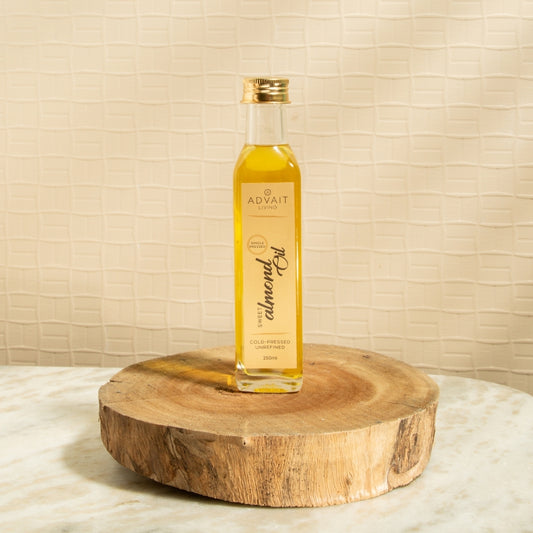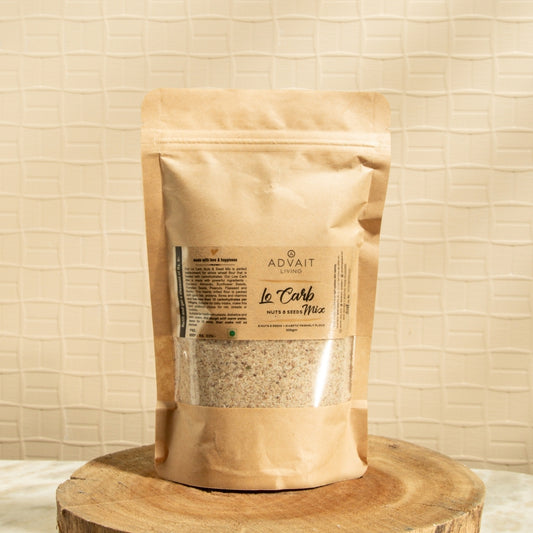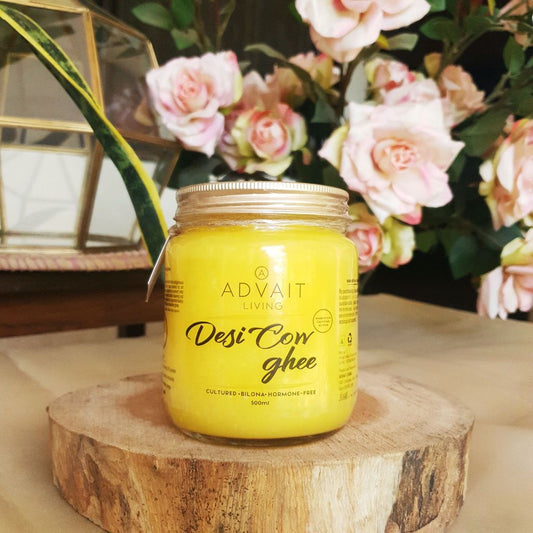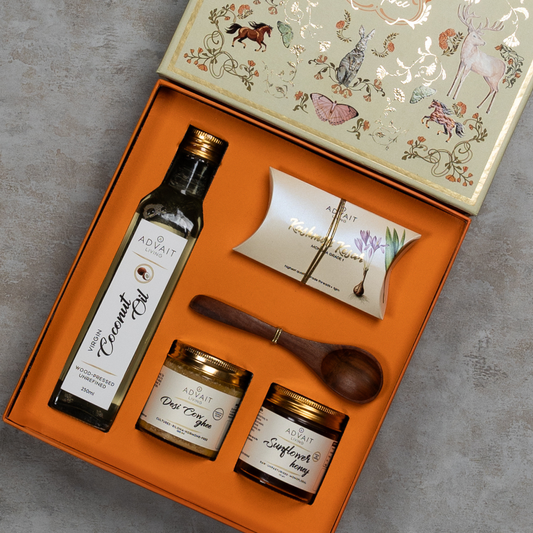Almond oil has been a natural elixir since ancient times and is widely practised in Ayurveda. Due to its exceptional benefits, this oil is used in the cosmetic industry, massage and aromatherapy. It is nourished with various nutritional components that focus on offering several benefits to mankind.
What is Almond Oil?
Almond oil is extracted from the drupe of the almond tree, Prunus dulcis. This tree belongs to the Rosaceae family native to hot climates. It is generally found across the Saharan plains, from Turkey and Iran to India and Nepal. Almond oil is commonly called Badam Tel in Hindi.
The misconception about the almond is that it is called a nut while it is actually a drupe. Unlike nuts, which contain a single layer, almonds have three distinct layers: Exocarp (outer fleshy part), Mesocarp (middle fleshy part), and Endocarp (Inner hard shell). Among these, the Endocarp is the edible part of the almond that is highly nutritious and has high market potential.
Almond Oil Extraction
The extraction of almond oil is done through various methods, such as solvent extraction, supercritical fluid extraction, and pressing. Among these, high oil recovery is achieved through solvent extraction and pressing. These different extraction processes highly influence the flavour and quality of the almond oil.
Variants of Almond Oil
Almond oil, in general, is available in two variants, bitter almond oil and sweet almond oil. The bitter almond oil is considered an essential oil and not suitable for consumption. This variant is extracted from Prunus amygdalus (bitter almond). It contains a high concentration of glycosides that convert into hydrogen cyanide during crushing or chewing of almonds. Thus, it is not suited for consumption and skin care applications. However, it has medicinal properties and is safe for external applications.
Sweet almond oil, on the other hand, appears pale yellow, devoid of any odour and has a nutty taste. This variant has low free fatty acids, peroxides and phosphatides and is best for consumption. This oil is mostly used as a carrier oil and is employed in medicinal and cosmetic formulations.
Composition of Almond Oil
The main component of almond oil is essential fatty acids such as oleic acid, linoleic acid and palmitic acid. It is enriched with carbohydrates, proteins and especially vitamins such as vitamin B complex, vitamins E and K. It also contains calcium, iron, magnesium, phosphorus, potassium and zinc, for a healthy-looking skin, hair and body. Besides this, it is also rich in beta-zoosterol, squalene, and alpha-tocopherol, all great supplements for skin health.
Benefits of Almond Oil for Skin, Body and Hair
Almond oil has been used as a means to treat several body ailments and enhance beauty through skin and hair care. It is also said that the usage of almond oil is prevalent in ancient Chinese, Ayurvedic and Greco-Persian schools of medicine.
Here are the 10 amazing benefits of almond oil for skin, body and hair.
1. Prevents UV Damage
Ultraviolet (UV) radiation penetrates the skin, primarily interacting with the DNA, leading to mutation. UV radiation is responsible for various harmful effects, such as sunburn, photodermatitis, premature ageing, and skin cancer.
A study conducted on mice shows that almond oil prevents the structural damage of the skin caused by harmful ultraviolet radiation. The results of various tests performed on the mice confirmed a reduction in the UV-light-induced photoaging effects on the skin. The photoprotective effect of almond oil is also confirmed by histopathological studies.
Thus, it proves that topical application of almond oil protects the skin from harmful UV radiation along with reducing the structural damage in the skin after UV exposure.
2. Maintains Skin Elasticity
Dry skin is one of the most common skin conditions affecting people of almost all ages. When the moisture in the skin completely drops off, it makes the skin prone to itchiness, cracking, flaking, premature ageing, etc.
Almond oil has been used extensively in traditional medicines like Ayurveda to maintain skin elasticity. It is also evident from research studies that almond oil effectively treats dry skin conditions like psoriasis and eczema. The light texture of this oil helps to penetrate deep into the skin and maintain soft and supple skin.
3. Effective for Body Massaging
The soothing effect of almond oil plays a major role in massage therapy. An experiment conducted by Timur Tashan and Kafkasli in 2012 demonstrated that massaging bitter almond oil from the 19th gestational week for 15 minutes reduces the pregnancy stretch marks. This oil also assists in preventing the formation of new stretch marks.
A recent clinical trial also claims that massaging the foot with sweet almond oil reduces leg oedema in pregnant women. Massaging this oil on the feet of patients undergoing hemodialysis reduces fatigue and improves their quality of life.
4. Prevents Acne
Acne, undoubtedly, prevails as a major skin concern in the world. It occurs when pores of the skin are clogged by excess sebum production. The fatty acid compounds in almond oil help to dissolve the excess sebum in the skin. As a result, it prevents the formation of acne, blackheads, and other skin problems caused by overproduction of sebum.
5. Improves Skin Complexion
Further, the presence of vitamin E in the almond oil enhances the skin tone and complexion. Besides vitamin E, other constituents like beta-zoosterol, squalene, and alpha-tocopherol play a vital role in improving skin conditions. Unlike other oils, such as coconut oil, almond oil is non-comedogenic and best suited for all skin types.
6. Reduces Puffiness and Under Eye Circles
Nourished with anti-inflammatory properties, the almond oil contributes to reducing any puffiness in the under-eye region. Other bioactive compounds like vitamins A, E, and K relieve under-eye bags and reduce fine lines around the eye.
7. Moisturises the Scalp
Almond oil, with the derivatives of vitamin B, when applied consistently, nourishes and moisturises the scalp. The regular application of this emollient penetrates your hair deeply and softens the texture of your hair.
8. Strengthens Hair Follicles
Biotin in the almond oil strengthens hair follicles, promotes hair growth and reduces hair thinning. Apart from this, vitamin E in the almond oil protects your hair against sun damage and other environmental stresses.
9. Treats Dandruff
Almond oil is a blessing for people suffering from stubborn dandruff problems. The antibacterial property of almond oil treats flaky skin and removes dead cells from the scalp.
10. Tame Frizzy Hair
Moisturising properties of almond oil effectively repair damaged and dry hair. Applying almond oil regularly helps to tame frizzy hair and restores it to its original lustre. A clinical trial in 2008 confirmed that almond oil has the same level of skin penetration and occlusion as paraffin oil. On that note, this study proved the safety and effectiveness of almond oil in terms of moisturising.
Also Read: Use Castor Oil for Hair: Evidence-Based Benefits and DIYs
Conclusion
Almond oil, undoubtedly, is a phenomenal natural solution for many skin and hair ailments. Be it protecting skin from harmful UV radiations or promoting hair growth, the potential benefits of almond oil are exemplary. However, it is important to opt for cold-pressed, pure, and non-toxic almond oil to retain the full benefits.
Frequently Asked Questions
1. Is Almond Oil Beneficial for Hair Regrowth?
Almond oil has been used as a natural remedy for hair problems like hair thinning, dry scalp, etc. However, there is no direct evidence to prove the effectiveness of almond oil for hair regrowth. On the other hand, scientific research proves that almond oil can moisturise your scalp, nourish hair follicles, and protect against UV damage.
2. Can I Use Almond Oil on My Body?
Yes, you can use almond oil on your body. This oil is widely used in massage therapy for its soothing and lubricating properties. Besides this, applying almond oil to your body reduces the appearance of stretch marks and scars.
3. Can We Apply Almond Oil on Our Face Everyday?
Yes, you can apply almond oil for a few minutes on your face every day. By applying almond oil to your face, you can keep your face moisturised, improve the skin complexion, and protect your face from harmful UV damage. However, it is advised to patch test before applying it on your face to test suitability.
4. Does Almond Oil Get Rid of Dark Spots?
Yes, almond oil has the potential to remove dark spots on regular application. It contributes to fading dark spots and improving skin tone. However, it is important to have realistic expectations and consult your dermatologist when needed.













































